The Curious Case Of 2025: A Calendar Repeat
The Curious Case of 2025: A Calendar Repeat
Related Articles: The Curious Case of 2025: A Calendar Repeat
- UMich Academic Calendar 2025: A Comprehensive Guide
- April 6, 2025: A Glimpse Into The Future
- Calendario 2025 Wallpaper: A Timeless Masterpiece For Your Digital Space
- 2025 Holiday Calendar: A Comprehensive Guide To Public Holidays Around The World
- 2025 Irish Calendar: A Comprehensive Guide To Public Holidays And Observances
Introduction
With enthusiasm, let’s navigate through the intriguing topic related to The Curious Case of 2025: A Calendar Repeat. Let’s weave interesting information and offer fresh perspectives to the readers.
Table of Content
Video about The Curious Case of 2025: A Calendar Repeat
The Curious Case of 2025: A Calendar Repeat

In the tapestry of time, where days, months, and years intertwine, there lies a curious phenomenon—the recurrence of identical calendars. One such instance is the year 2025, which will mirror the calendar of 1996, 2007, and 2018. This intriguing coincidence prompts us to explore the intricate workings of our timekeeping system and delve into the implications of such calendar repeats.
The Rhythm of Time: The Gregorian Calendar
The calendar we commonly use today is the Gregorian calendar, named after Pope Gregory XIII, who introduced it in 1582 to rectify inaccuracies in the Julian calendar. The Gregorian calendar is a solar calendar, meaning it is based on the Earth’s orbit around the Sun. It has 365 days in a year, with an extra day added every four years (leap year) to account for the Earth’s orbit not being an exact multiple of 365 days.
The 400-Year Cycle: The Metonic Cycle
Within the Gregorian calendar, there exists a pattern known as the Metonic cycle. This cycle, discovered by the Greek astronomer Meton in the 5th century BC, observes that after 19 solar years, the phases of the Moon recur on the same day of the year. This cycle has a period of approximately 6,940 days, which is equivalent to 19 tropical years.
The 28-Year Cycle: The Solar Cycle
Another significant cycle in the Gregorian calendar is the solar cycle, which spans 28 years. This cycle tracks the alignment of the days of the week with the dates of the month. After 28 years, the days of the week fall on the same dates, creating a repeating pattern in the calendar.
The Intersection of Cycles: 2025 and Its Predecessors
The year 2025 is a remarkable intersection of the Metonic cycle and the solar cycle. The Metonic cycle aligns the phases of the Moon with the days of the week, while the solar cycle aligns the days of the week with the dates of the month. This confluence of cycles results in the calendar of 2025 being identical to that of 1996, 2007, and 2018.
Implications of Calendar Repeats
Calendar repeats have several implications for various fields. In astronomy, they aid in predicting celestial events such as eclipses and meteor showers. In history, they facilitate the study of past events and the dating of historical records. In religious observances, they influence the timing of festivals and holidays that are based on specific dates or lunar phases.
The Significance of 2025
The year 2025 holds particular significance due to its alignment with both the Metonic cycle and the solar cycle. This alignment occurs only once every 28 years, making 2025 a unique and noteworthy year. It is a testament to the precision and predictability of our timekeeping system, which has served as a reliable framework for human civilization for centuries.
Conclusion
The recurrence of identical calendars, such as the case of 2025, is a fascinating phenomenon that showcases the intricate interplay of astronomical cycles and human ingenuity. The Gregorian calendar, with its Metonic and solar cycles, provides a precise and predictable framework for measuring time. The year 2025, as a mirror of its predecessors, serves as a reminder of the cyclical nature of time and the enduring power of human knowledge.








Closure
Thus, we hope this article has provided valuable insights into The Curious Case of 2025: A Calendar Repeat. We hope you find this article informative and beneficial. See you in our next article!